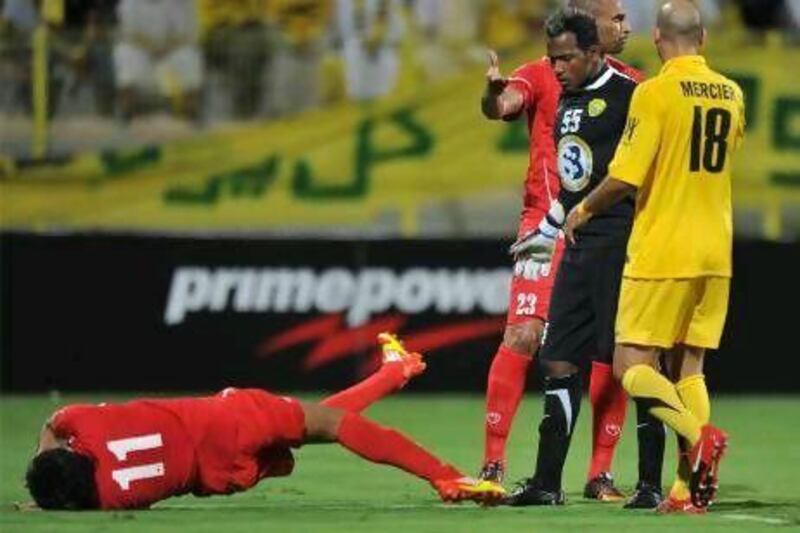Majed Naser's moments of madness may have ramifications that shake UAE football. Diego Maradona's second season at Al Wasl could be at risk and the Olympic team may be vulnerable without the nation's most gifted goalkeeper, as well as its most troubled.
His expulsion, for butting an opponent in the 10th minute of the GCC Clubs Championship final against Al Muharraq of Bahrain on June 10, rocked Wasl.
The Dubai club had posted a 3-1 away victory in the first leg of the final, and fans and club officials at Zabeel Stadium fully expected to celebrate their first trophy since winning the same competition in 2010.
Yes, it is an exceedingly modest tournament, but it would have been Maradona's first trophy as a coach, perhaps vindicating the club's appointment of the Argentine whose side had been so unimpressive during the domestic season.
The stands were nearly filled and the VIP sections were packed on a hot and still night. Anticipation ran high.
The shock of Naser's quick sending off was palpable and soon was felt by Wasl's remaining 10 men. Muharraq erased that 3-1 first-leg outcome with a 3-1 performance of their own, then won the penalty shoot-out 5-4. The post-match fireworks and confetti cannon that Wasl officials no doubt envisioned as gleeful exclamation marks on their championship instead were shot off for Muharraq.
The anger of the crowd, what was left of it five minutes after the result went final, was intense. When Naser came out of the changing room to accept his silver medal, with the rest of his team, he was verbally abused by shouting supporters. He later left the stadium through a back door.
Outsiders should not underestimate how sensitive Pro League executives are to perceived public opinion. Naser was seen as the cause of an embarrassing loss, one fraught with shameful displays (his red card, and Rashid Essa's, an hour later), and they reacted. On Tuesday, the Wasl board asked the FA to ban Naser for the whole of the 2012/13 season, this on top of the 17-game ban he was still serving for attacking Quique Sanchez Flores, the Al Ahli coach, after an Etisalat Cup semi-final.
On Thursday, the whole of the Wasl board resigned, including the chairman, Marwan bin Beyat, whose most notable decision had been to hire Diego Maradona, a move bin Beyat steadily defended.
Maradona so far has been impervious to the perils of coaching in the UAE; he won nothing with a big club, yet he has kept his job.
That could change at any moment under the new board, who may not be as inclined to accept Maradona's celebrity in lieu of results. If he is sent packing, it will almost certainly be a direct result of his and the club's decision to bring back Naser for the non-domestic competition, and Naser's subsequent act of rage.
How does his ban impact the Olympic team? Because the weakest position in Mahdi Ali's squad appears to be at goalkeeper.
When inviting four players to fill the three over-age-23 slots allowed on the Olympic roster, the goalkeeper selected by the coach was Ali Kasheif of Al Jazira.
This was perfectly sensible, given that Naser was already serving the 17-match ban, but Kasheif is still struggling to recover his 2010/11 form following knee surgery and a shortened 2011/12 campaign that included 12 goals conceded in eight league matches. Naser has been the UAE's first-choice goalkeeper in every major international competition since 2007, two Asian Cups, two World Cup qualifying campaigns.
Coaches from Bruno Metsu through Dominique Bathenay, Srecko Katanec and Abdullah Misfir all chose Naser.
He had played well in the biggest arenas. He was in the nets for a scoreless draw in Tehran seen by 50,000. He was the last defender in Pyongyang before another 50,000. It was Naser in goal before 70,000 in Riyadh, when Saudi Arabia won 3-2 through a penalty and a UAE own goal.
He had been nearly flawless in Doha, at the 2010 Asian Cup, giving up four goals in three matches. Two were own goals. If any one man seemed prepared to wear the gloves at London 2012, where the first two matches will be at Old Trafford and Wembley, Naser seemed like that man.
Until he lost control.
His assault of Sanchez Flores made it impossible for Mahdi Ali to choose him. The red card against Muharraq may end his international career.
The UAE needs all hands on deck when playing Uruguay, Great Britain and Senegal in England. Naser's hands would have been particularly useful.
[ poberjuerge@thenational.ae ]
Follow us
[ @SprtNationalUAE ]





